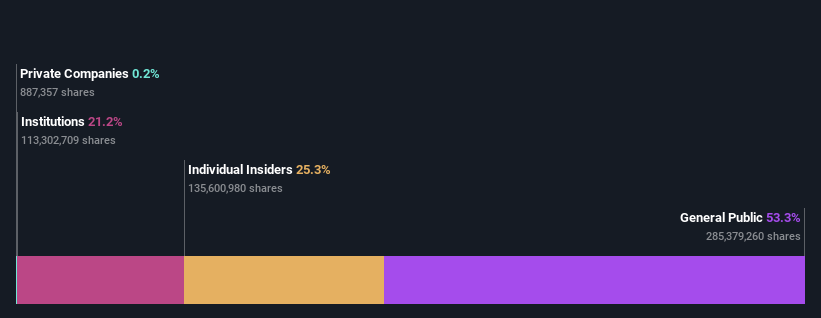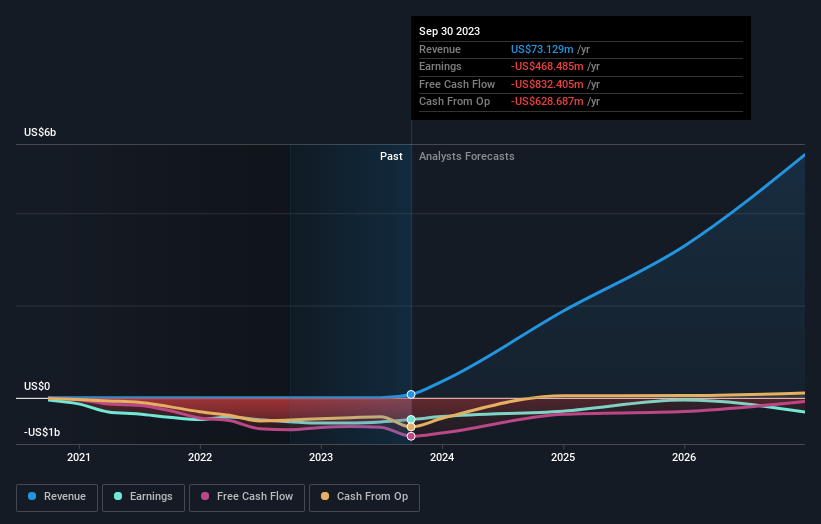- United States
- /
- Auto
- /
- OTCPK:FSRN.Q
Fisker Inc.'s (NYSE:FSR) market cap dropped US$66m last week; Retail investors bore the brunt

Key Insights
- Fisker's significant retail investors ownership suggests that the key decisions are influenced by shareholders from the larger public
- The top 25 shareholders own 44% of the company
- Insiders own 25% of Fisker
To get a sense of who is truly in control of Fisker Inc. (NYSE:FSR), it is important to understand the ownership structure of the business. The group holding the most number of shares in the company, around 53% to be precise, is retail investors. Put another way, the group faces the maximum upside potential (or downside risk).
Following a 16% decrease in the stock price last week, retail investors suffered the most losses, but insiders who own 25% stock also took a hit.
In the chart below, we zoom in on the different ownership groups of Fisker.
See our latest analysis for Fisker

What Does The Institutional Ownership Tell Us About Fisker?
Institutional investors commonly compare their own returns to the returns of a commonly followed index. So they generally do consider buying larger companies that are included in the relevant benchmark index.
We can see that Fisker does have institutional investors; and they hold a good portion of the company's stock. This suggests some credibility amongst professional investors. But we can't rely on that fact alone since institutions make bad investments sometimes, just like everyone does. It is not uncommon to see a big share price drop if two large institutional investors try to sell out of a stock at the same time. So it is worth checking the past earnings trajectory of Fisker, (below). Of course, keep in mind that there are other factors to consider, too.

We note that hedge funds don't have a meaningful investment in Fisker. From our data, we infer that the largest shareholder is Geeta Gupta-Fisker (who also holds the title of Chief Financial Officer) with 12% of shares outstanding. Its usually considered a good sign when insiders own a significant number of shares in the company, and in this case, we're glad to see a company insider play the role of a key stakeholder. With 12% and 3.7% of the shares outstanding respectively, Henrik Fisker and The Vanguard Group, Inc. are the second and third largest shareholders. Interestingly, the second-largest shareholder, Henrik Fisker is also Chief Executive Officer, again, pointing towards strong insider ownership amongst the company's top shareholders.
On studying our ownership data, we found that 25 of the top shareholders collectively own less than 50% of the share register, implying that no single individual has a majority interest.
While studying institutional ownership for a company can add value to your research, it is also a good practice to research analyst recommendations to get a deeper understand of a stock's expected performance. There are a reasonable number of analysts covering the stock, so it might be useful to find out their aggregate view on the future.
Insider Ownership Of Fisker
While the precise definition of an insider can be subjective, almost everyone considers board members to be insiders. Management ultimately answers to the board. However, it is not uncommon for managers to be executive board members, especially if they are a founder or the CEO.
Most consider insider ownership a positive because it can indicate the board is well aligned with other shareholders. However, on some occasions too much power is concentrated within this group.
Our information suggests that insiders maintain a significant holding in Fisker Inc.. Insiders own US$85m worth of shares in the US$337m company. This may suggest that the founders still own a lot of shares. You can click here to see if they have been buying or selling.
General Public Ownership
The general public -- including retail investors -- own 53% of Fisker. This size of ownership gives investors from the general public some collective power. They can and probably do influence decisions on executive compensation, dividend policies and proposed business acquisitions.
Next Steps:
While it is well worth considering the different groups that own a company, there are other factors that are even more important. Be aware that Fisker is showing 4 warning signs in our investment analysis , and 1 of those is potentially serious...
Ultimately the future is most important. You can access this free report on analyst forecasts for the company.
NB: Figures in this article are calculated using data from the last twelve months, which refer to the 12-month period ending on the last date of the month the financial statement is dated. This may not be consistent with full year annual report figures.
New: AI Stock Screener & Alerts
Our new AI Stock Screener scans the market every day to uncover opportunities.
• Dividend Powerhouses (3%+ Yield)
• Undervalued Small Caps with Insider Buying
• High growth Tech and AI Companies
Or build your own from over 50 metrics.
Have feedback on this article? Concerned about the content? Get in touch with us directly. Alternatively, email editorial-team (at) simplywallst.com.
This article by Simply Wall St is general in nature. We provide commentary based on historical data and analyst forecasts only using an unbiased methodology and our articles are not intended to be financial advice. It does not constitute a recommendation to buy or sell any stock, and does not take account of your objectives, or your financial situation. We aim to bring you long-term focused analysis driven by fundamental data. Note that our analysis may not factor in the latest price-sensitive company announcements or qualitative material. Simply Wall St has no position in any stocks mentioned.
About OTCPK:FSRN.Q
Fisker
Develops, manufactures, markets, leases, or sells electric vehicles.
Moderate and slightly overvalued.
Similar Companies
Market Insights
Community Narratives




